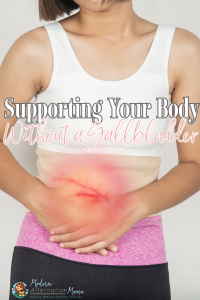In high school, I frequently visited the emergency room due to excruciating pain in my abdomen. Every time I showed up, all my symptoms pointed to my gallbladder. My blood work, x-rays, and ultrasounds were all normal. Unfortunately, the hospital claimed protocols wouldn’t allow a CT scan unless I had visited the hospital enough times with the same complaint. I tried to find a private doctor, but they refused to see me because of my young age. Talk about medical gaslighting!
After well over a dozen visits to the emergency room and hospital bills piling up, I finally got my CT scan and an appointment with a gastroenterologist. The recommendation was a cholecystectomy (gallbladder removal). They told me the gallbladder wasn’t important or necessary, and I wouldn’t even notice it was gone.
At the time, I didn’t think anything of it; I wasn’t even aware of natural health alternatives. I was 17 and wanted to feel better, so I agreed to my first surgery. I trusted the surgeon but quickly learned that contrary to popular belief, all organs are equally important – even the gallbladder.
Understanding the Gallbladder’s Role
The gallbladder is a small, pear-shaped organ located under the liver and is a vital part of the digestive tract (1). The gallbladder, liver, and small intestines work together to help us digest fat. The liver produces a thick liquid that breaks consumed fats down into fatty acids, and the gallbladder stores it to promote digestion later (2). When bile is needed in the digestive process to break down fats, the gallbladder’s thin, muscular lining squeezes the bile into the main bile duct and then into the small intestine (3).
The more fat consumed, the more bile is produced and stored in the gallbladder. The overproduction of bile can lead to issues like gallstones and cholecystitis, which may require surgery like gallbladder removal.
Supporting Your Body Without A Gallbladder
Post-cholecystectomy, there is no storage facility for the bile produced by the liver. Instead of using bile as needed in the digestive process, the bile will continuously flow out of your bile ducts directly into your small intestine (4). Of course, you can live without a gallbladder, but you may experience some unpleasant symptoms like (5):
- Diarrhea
- Fatty food intolerance
- Gas
- Heartburn
- Nausea
- Vomiting
- Jaundice
- Intermittent episodes of abdominal pain
Supporting your remaining organs (especially the liver) is crucial post-cholecystectomy. With the liver constantly dripping bile into the small intestine, it never has time to rest and becomes overworked, leading to issues like liver congestion. Additionally, due to the overproduction of bile, the liver can’t do its other functions.
If you read our blog, Liver Support for PMS, you know the liver has many important hormonal and metabolic functions. It converts dietary nutrients into substances that the body can use, stores these substances, and supplies cells with them when needed. The liver helps regulate sex, thyroid, cortisone, and other adrenal hormones. The liver also converts toxic substances into harmless substances or ensures they are released from the body (6,7).
With the liver working overtime, it’s important to support it and avoid overburdening it. You can support the liver predominantly through diet. My top tips for supporting the liver include:
- Drink warm or room-temperature lemon water to promote digestion and purify the liver.
- Limit fatty and oily foods (some say fat should make up no more than 30% of dietary calories) to decrease the risk of fatty liver and digestive upsets.
- Decrease alcohol consumption to avoid overworking and damaging the liver.
- Increase fiber intake to promote and regulate bowel movements.
- Eat smaller portions (even if eating more frequently) to help the food mix with the bile and prevent the liver from producing too much too quickly.
My biggest tip is to pay attention to how your body reacts to foods. You may notice that certain foods post-cholecystectomy are harder to digest or cause digestive upsets. Personally, I struggle to digest animal products, dairy, greasy/fried foods, and acidic foods, including coffee. Keep an eye on how your body feels after meals and consider an elimination diet.
Looking to support digestion? Earthley’s Digest-Support has been a lifesaver for my digestive needs, and I use it daily. Another great option is Earthley’s Digest-Ease. You can even try homemade fennel-infused or thyme-infused apple cider vinegar.
Aside from dietary changes, I also like to use herbs liver-supporting herbs like:
- Anise seeds – anti-inflammatory and stomach-protecting properties
- Dandelion – liver and digestive-supporting properties
- Fennel – anti-inflammatory and digestive-supporting properties
- Hyssop – anti-inflammatory and digestive-supporting properties
- Milk thistle – supports and detoxes the liver
- Peppermint – liver and digestive-supporting properties
- Rosemary – antibacterial and anti-inflammatory properties
- Thyme – antibacterial properties and nutrient-rich.
- Turmeric – liver-supporting and anti-inflammatory properties
If you’re new to herbs or looking for an easier way to support your liver, try Earthley’s Liver Love or Liver Oil!
Liver Love combines organic dandelion root, milk thistle seed, peppermint leaf, turmeric root, and black pepper in an alcohol or vegetable glycerin base to promote liver health by supporting detox and proper function.
Black Liver Oil combines hemp seed oil, black seed oil, and key herbs to give your liver what it needs to do its job well — and make your whole body healthier!
Disclaimer: This post is not intended as medical advice. These statements have not been evaluated by the FDA, and nothing in this post is intended to diagnose, treat, or cure anything. If you have questions, please do your own research or seek advice from a health professional.







